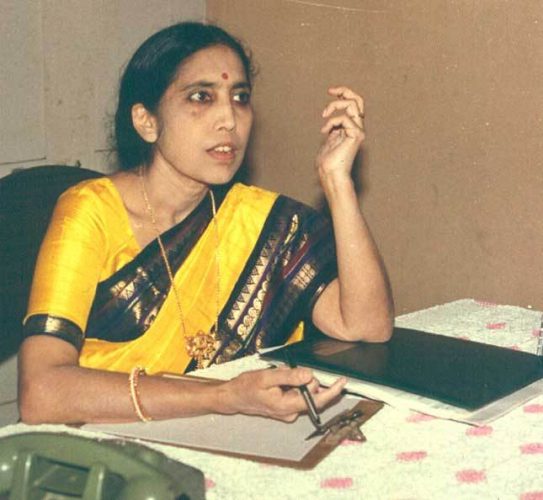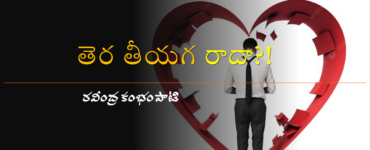Fiction writing in Telugu started in the later part of 19th century with Rajasekhara Charitamu by Kandukuri Veeresalingam, a well-known social reformer of the day. Short-story writing gathered momentum in the first decade of 20th century. Though storytelling was not new to the Indian people, the manner of it changed its track as the interaction with the West and knowledge of western literature grew amongst the people of India. This trend continued through the country. But readers were limited before independence. P. Sridevi’s Kalaateeta Vyaktulu published in 1958 was the only prominent novel by a woman writer during that period. Magazines like Bharathi focussed on matters of serious literature, especially genres such as poetry, literary criticism and reviews. On the other hand, weekly publications such as Andhrapatrika, Andhraprabha, Andhrajyothy; monthly magazines such as Yuva, Jyothi, Swathy, Vipula, Chatura went on to become household names. They kept up their popularity rating by publishing novels and novellas in serial format, in addition to the usual short stories. Competitions were organised and awards announced for the best amongst them. Women writers and readership amongst women went up by leaps and bounds. Several creatively inclined women, found a platform in these magazines. Yaddanapudi Sulochana Rani was the product of these times.
Yaddanapudi Sulochana Rani started writing at a very young age, while she was a high school student. She spent her entire childhood in a village and hailed from a traditional family. She was not sent for higher studies and was married off early in life and consequently, familiarised herself with the urban life only after her marriage. She became a very popular writer with her first novel Secretary. Amongst the college students it created a huge craze as it was originally published as a serial in Jyothy. Soon her second novel Jeevana Tarangalu was published. In quick succession, Vijetha, Meena, Aradhana– and a number of other novels appeared in various magazines. Most of her earlier novels like Secretary, Jeevana Tarangalu, Meena and Vijetha were made into successful films. Meena was filmed twice with different titles. Later on, gradually she began to write exclusively for films and Television serials. All the serials like Radha-Madhu and Ruthuragalu and Mogali Rekulu became popular too.
Now coming to Jeevana Tarangalu an analysis of the text brings to the forefront some important aspects that dispel the views that Yaddnapudi was merely a writer of soft romances, creator of dreams for the youth of the day and a number of opinions that dampen her creative merit.
What is Jeevana Tarangalu, the waves of life like the waves of the sea roll on unendingly. Joys, sorrows, disappointments, joblessness, poverty, social stigmas – we see everything. A sense of pride and self-esteem govern the life and actions of Roja, the protagonist, and Vijay, her confronter. who is prejudiced, arrogant and self-assured, all qualities that came with being a successful lawyer. But the story initially starts with Roja and Anant, Vijay’s a step-brother. He also happens to be the guardian and trustee of Anant’s property and he guards his movements and keeps track of his friends and habits so as to oversee his property. Anant, a good-natured youth, becomes a close friend of Roja’s. He uses her often to escape the domineering discipline of Vijay and to get rid of the marriage proposals Vijay brings for his brother. One such match was the daughter of Pundarikashayya. Roja writes an anonymous letter reporting to him that Anant was not a decent man and was already in love with another girl. Anant starts feeling that he was in love with Roja. Though not keen, Roja sees it as an opportunity to get rid of her personal struggles at home. But on the day of marriage Roja decides to back out and writes a letter to Anant explaining her dreams about marriage and her life after. She keeps it in her purse. Vijay comes to know of this plan through his lawyer friend whom Anant takes into confidence. He foils Anant’s plan and kidnaps Roja and takes her to their proposed marriage venue, a temple in the suburbs. There Roja is drugged and Vijay marries her. Roja is shattered when she comes to her senses.
Anant too gets up from his drug induced sleep and realises how he was duped by his brother. He gets so angry that he leaves his house and shifts to the house of Venugopal Rao.
Venugopal Rao is another central character in this novel. The novel opens with the scene where Roja’s brother, Chandu, tries to steal a necklace from him in Secunderabad Railway station and gets caught. In his anger Venugopal Rao slaps him. He was a prominent businessman in town and Vijay helps him in his legal matters in addition to being a close associate of the family for a long time. He helps Vijay and Anant both as a neighbourhood uncle and like a member of the family. He has two daughters, Lavanya and Radha, who was speech impaired. He was very fond of his younger daughter. His first daughter was born to his wife by her friend before marriage. Out of sympathy this woman who was living on rent in their house at that time, Venugopal Rao marries her to save her from disgrace. He goes to his village and takes his wife Savitramma’s permission to go ahead with this act of kindness. She agrees to it, trusting him implicitly. He becomes the son-in-law of a rich businessman thus. His wife Lalitha becomes too domineering and takes pains to completely severe his connections with his wife and two kids Roja and Chandu. She stops all the letters that Savitramma writes from reaching his hands. When he comes back he could not meet them as they had left the place along with Sankarayya, Savitramma’s brother. Savitramma was compelled to live with her brother along with her two children and she was mentally shattered by this. Both Roja and Chandu were harassed by Sankarayya’s wife. Fed up, Chnadu runs away from the house chooses the path of crime by joining a gang of dacoits. That was how he ends up stealing Venugopala Rao’s neckless in Secunderabad railway station.
Now Roja with Anant’s help joins Venugopala Rao’s household as a domestic help. In due course of time Lavanya misunderstands the closeness between her father and the new maid. She becomes jealous of Roja’s place in their house. Lavanya tries constantly to get rid of Roja but Venugopala Rao who comes to understand through Roja that she was his own daughter was reluctant to leave Roja to her fate. He wanted to win the trust of his children and go to his wife to explain the circumstances of his separation from her and their two children. But before he could do anything Savitramma dies and Venugopala Rao’s suffering knows no bounds. He did not know how to reveal himself as their father before his children.
In the meanwhile, Lavanya develops good friendship with Chandu. She knows him as James and she gets so close to him that she confides to him her feelings and insecurities about her father’s affection for Roja. Lavanya plans to arrange the marriage of Vijay with her friend from Pune Ms Joshi. But Vijay gradually starts believing in Roja’s innocence after reading the letter she writes to Anant and determines himself that he should somehow compensate for the loss he caused to Roja. This new attraction between Vijay and Roja becomes another sore point to Lavanya. She begins to depend on her friendship. Once in distress she invites Chandu and requests him to break open the safe to access the will her father had written. When her father goes to the park, she calls him home and they break the safe open. While they are still on the job Venugopal Rao comes back. The events move fast and Venugopala Rao dies and Chandu and Lavanya’s plan to run away gets muddled. Chandu directs her to come while he waits for her outside. As Lavanya was about leave, Roja comes there and Lavanya cleverly implicates her in the murder. She gets arrested. She does not utter a word as she goes into shock. Vijay who was out of station rushes back on hearing about the death and he posts Roja’s bail and takes her to his house. From the police he hears that Venugopala Rao was still struggling for his life and has not breathed his last. Chandu comes to Vijay’s house to surrender. All of them go to the hospital to see Venugopal Rao. Police come to arrest him but Chandu tries to run and collapses because of the blood he donates to his father. After his arrest Chandu gives them all the details of the gang he was working for. There is case in the high court room and Vijay presents Chandu’s case, which in fact is an eye opener to the readers. Everyone feels the plight of Chandu who was a poor, fatherless, directionless kid who had gone astray and took to crime. After he was sentenced, while being taken back to prison, he is shot dead by his gang. Chandu dies, Venugopal Rao leaves for an old-age home in Kerala. Lavanya repents and leaves the city as Venugopal Rao fails to bring her back into the family fold. He also leaves, having failed to convince Roja to marry Vijay . Anant leaves, disgruntled as he comes to know of the marriage of Roja and Vijay and finally story ends with both of them getting together to bring up Chandu’s child born out of wedlock to Mary.
True to its title, the story deals with the misfortunes of a brother and sister that visit them unendingly like the waves of an ocean. At end of the novel, the reader is left with the bitterness of the unfortunate death of Chandu. How financial distress forces him to leave his academic pursuits, which he was fond of. Failing to get even a small job adds to his sense of failure. His attachment to Roja and how he feels responsible for her troubles and his final screams that he wants ‘to live and he does not want to die’ haunt the reader. The novel focuses on poverty and unemployment. The difference in the way Roja and her brother Chandu deal with the same difficulties tells us of the spirit of Roja who was a survivor and a fighter. While Roja earns the respect of Venugopal Rao and Vijay, gradually Chandu entangles himself deeper and deeper in the murky world of crime. Also, the reader is driven to notice the difference between Vijay and Anant as the brothers have totally different perception of relationships, property management, attitude to life, career and yet there was an innate value system that guides their life even if they are poles apart. Roja is the catalyst who intentionally and unintentionally keeps them together despite their differences.
*









It’s a good, detailed introduction to the popularity gained by women writers in Telugu across a whole generation. You also provided an overview of the writings of Sulochana Rani. (Seems to have ended abruptly). It is true that women writers of that era contributed to a significant expansion in readership base – especially among women. Their novels also paved the way for writers like Ranganayakamma and subsequently Volga – who brought in a clear ideological approach and a well defined political agenda – taking Chalam’s unique contribution forward. After reading this, couple of questions occurred to me. Was this phenomenon unique to Telugu literature? How come her writings are not considered as ‘serious’ literature by most people even today? How and why did we lose the readership base created by those women writers?…On the whole, a thought-provoking essay. Congratulations once again!
Thank you Sudhakar. My perception is that there are categories of readers just we have writers who appeal to different tastes. In the earlier times when writing itself was not popular women wrote with limited vision and experience. People also read whatever came in their way. Reading magazines was then a new trend and preoccupation. Mostly readers read whatever came their way. But uniformly all of us love good love stories. All love stories may not be good. When writers began to write with ideologies new windows and doors were opened. People’s choices improved and their horizons widened. I don’t agree to the view that readership declined. With new choices the readership divided itself between various ideologies. Every writer started building up his individual reader base. We are better of now. You don’t have to read whatever comes in your way . You can choose. Personally I believe one should never stop reading good love stories. Something is wrong with a culture that cannot appreciate a good love story. My response. Thanks